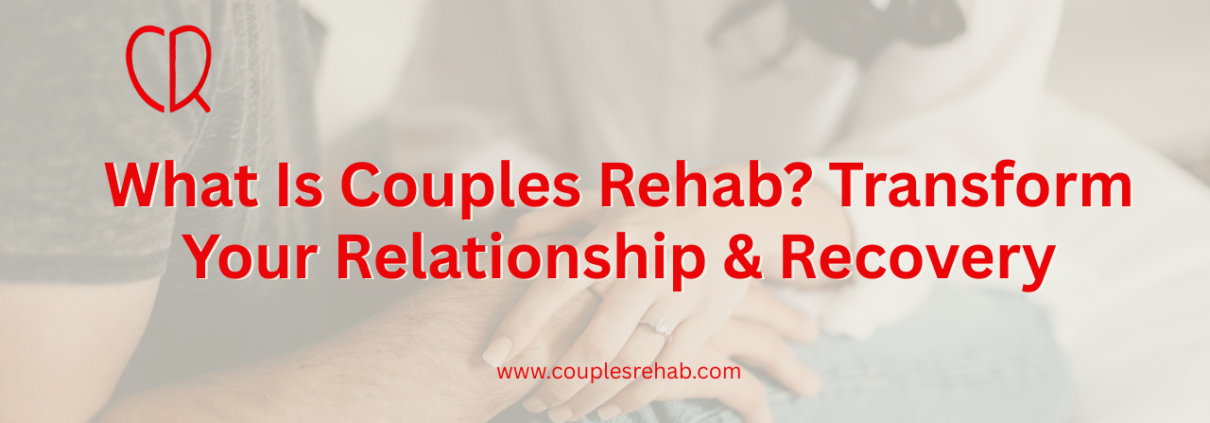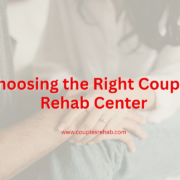According to recent studies, addiction affects nearly 21 million Americans – and for every person struggling with substance abuse, there are typically 4-5 loved ones directly impacted. When addiction enters a relationship, both partners suffer, regardless of which person is using substances. The ripple effects can devastate intimacy, trust, communication, and shared goals, creating a cycle where relationship problems and substance use reinforce each other.
Couples rehab offers a groundbreaking alternative to traditional individual treatment. This innovative approach recognizes that addiction is often intertwined with relationship dynamics and addresses both simultaneously. At Couples Rehab in Huntington Beach, we’ve pioneered specialized programs that treat partners together, helping them heal not just from addiction but also rebuild their relationship foundation.
Understanding Couples Rehab: A Comprehensive Approach to Addiction Treatment
Traditional addiction treatment typically focuses on the individual with the substance use disorder, sometimes viewing relationships as secondary concerns to be addressed after sobriety is established. Couples rehab turns this model on its head by recognizing that relationships and addiction are often inextricably linked.
In couples rehab, your relationship isn’t seen as an obstacle to recovery but as a potential catalyst for healing. This approach acknowledges that substance use affects both partners profoundly, even when only one person has a clinical addiction. The non-using partner may develop coping mechanisms, resentments, trust issues, or enabling behaviors that require professional attention.
Couples rehab is particularly appropriate for situations where:
- Both partners are committed to the relationship
- Substance use has become a source of conflict
- One or both partners are struggling with addiction
- Patterns of enabling or codependency have developed
- Previous individual treatment attempts haven’t yielded lasting results
The Science Behind Couples-Based Addiction Treatment
The effectiveness of couples rehab isn’t just anecdotal – it’s backed by compelling research. Studies dating back to the 1980s have consistently shown that involving partners in addiction treatment can significantly improve outcomes. In a landmark 2004 study by O’Farrell and Fals-Stewart, couples who participated in Behavioral Couples Therapy (BCT) showed greater abstinence rates and relationship satisfaction compared to those in individual treatment alone.
More recent research has deepened our understanding of why this approach works. A 2019 meta-analysis published in the Journal of Substance Abuse Treatment revealed that including partners in treatment resulted in approximately 30% better long-term sobriety outcomes compared to individual treatment approaches.
From a neurobiological perspective, addiction impacts the brain’s reward system – the same system involved in bonding and attachment. Dr. Michael Preston, addiction psychiatrist, explains: “When we treat couples together, we’re essentially helping rewire the reward pathways that have become associated with substances, redirecting them toward healthy relationship rewards instead.”
Key Components of an Effective Couples Rehab Program
Assessment and Intake Process
At Couples Rehab in Huntington Beach, the journey begins with a comprehensive evaluation for both partners. This assessment goes beyond standard addiction screening to examine relationship dynamics, communication patterns, trauma history, and co-occurring mental health conditions.
Medical Detoxification for Couples
What to Expect During the First Few Days of Couples Detox
For couples where one or both partners require detoxification, our medical team provides round-the-clock supervision while keeping you together as much as safely possible. The non-detoxing partner receives support and education during this time, helping them understand what their loved one is experiencing.
During detox, the non-using partner participates in education sessions about addiction as a brain disease, which often helps reduce blame and increase empathy. They also begin individual therapy to address their own emotional needs and prepare for the couples work ahead.
Therapy Modalities in Couples Rehab
Evidence-Based Approaches Used in Couples Addiction Treatment
Our program utilizes several evidence-based therapies specifically designed or adapted for couples:
Behavioral Couples Therapy (BCT): This structured approach focuses on building support for abstinence while improving relationship functioning. Couples create a “Recovery Contract” that includes daily rituals to express support and appreciation.
Cognitive Behavioral Therapy for Couples (CBT-C): Partners learn to identify and change thought patterns that contribute to substance use and relationship discord.
Alcohol Behavioral Couples Therapy (ABCT): Similar to BCT but with specific protocols for alcohol use disorders, including structured sobriety agreements.
Emotionally Focused Therapy (EFT): This approach helps couples identify and transform negative interaction patterns, creating more secure attachment bonds that support recovery.
What Types of Therapy Are Used in Couples Rehab for Dual Diagnosis?
For couples dealing with both substance use and mental health conditions (known as dual diagnosis), we employ integrated treatment approaches:
Integrated Dual Disorder Treatment (IDDT): Addresses both addiction and mental health simultaneously rather than separately.
Trauma-Informed Couples Therapy: Essential for couples where trauma plays a role in substance use, this approach ensures safety while processing traumatic experiences together when appropriate.
Medication-Assisted Treatment (MAT) with Couples Counseling: For certain substance use disorders, medications may be incorporated alongside specialized couples therapy.
Communication and Relationship Skill Building
Effective communication forms the cornerstone of both recovery and relationship healing. Our program includes structured workshops where couples practice:
- Active listening techniques
- Non-blaming “I” statements
- Emotional regulation during difficult conversations
- Constructive conflict resolution
- Expressing needs clearly and respectfully
Couples learn to identify triggers – both for substance use and relationship conflict – and develop plans for handling them together. Setting healthy boundaries becomes a shared skill, with partners supporting each other’s limits around substances, high-risk people, or situations.
The Process of Couples Inpatient Rehab for Drug Addiction
A typical inpatient stay at Couples Rehab lasts 30-90 days, depending on the couple’s needs and progress. The journey generally follows this timeline:
Week 1: After detox (if needed), couples begin separate individual therapy while attending educational groups together. This period focuses on stabilization and building a foundation of knowledge about addiction.
Weeks 2-3: Couples therapy begins, alongside continued individual sessions. Partners start identifying relationship patterns connected to substance use and practicing basic communication skills.
Weeks 4-8: Deeper therapeutic work addresses underlying issues like trauma, intimacy challenges, and family-of-origin patterns. Couples practice new skills in increasingly challenging scenarios.
Final Weeks: Focus shifts to relapse prevention planning as a couple and preparing for the transition home. Aftercare plans are developed with the treatment team.
A typical day in couples rehab includes structured therapy sessions, individual counseling, educational groups, and recreational activities designed to rebuild connection in a substance-free environment. While much of the program involves joint activities, we balance this with individual therapy and gender-specific groups. This approach respects each person’s individual journey while strengthening your partnership.
Benefits of Couples Rehab for Addiction Treatment
Strengthening Relationship Foundations During Recovery
One of the most powerful benefits of couples rehab is the opportunity to rebuild your relationship on a foundation of honesty and sobriety. Many couples describe addiction as “the third person” in their relationship – always present, always demanding attention. Removing this influence allows you to rediscover each other.
Through structured therapy, couples learn to rebuild trust incrementally, starting with small agreements and gradually addressing larger breaches. Emotional intimacy often returns before physical intimacy, as partners learn to be vulnerable with each other without substances mediating their connection.
“We had forgotten how to just be together without alcohol,” shares Michael, a program graduate. “Learning to date each other again, to talk and connect while sober – that was both scary and beautiful.”
Addressing Codependency and Enabling Behaviors
In relationships affected by addiction, unhealthy patterns often develop gradually. The non-using partner may begin covering for absences, making excuses for behavior, or taking over responsibilities – all forms of enabling that inadvertently support continued use.
Codependency emerges when one partner’s sense of purpose becomes wrapped up in “rescuing” or taking care of the other. In couples rehab, both partners learn to identify these patterns and develop healthier alternatives.
“I thought I was helping by calling in sick for him when he was hungover,” explains Jennifer, whose husband struggled with alcohol use disorder. “Our therapist helped me see how my ‘help’ was actually making it easier for him to keep drinking. Learning to set boundaries was the hardest and best thing I’ve ever done for us.”
Creating a United Recovery Front
When couples recover together, they develop a shared language and understanding of addiction. This creates powerful alignment in recovery goals and strategies. Partners learn to recognize each other’s triggers and warning signs, often noticing subtle shifts before the person themselves is aware.
This united front extends beyond the treatment setting. Couples develop joint strategies for navigating social situations, family gatherings, and other potential challenges to sobriety. Having rehearsed these scenarios in therapy, they face the real world with confidence in their shared plan.
Success Rates of Couples Rehab Compared to Individual Treatment
Research consistently shows improved outcomes for couples-based treatment compared to individual approaches alone. Studies indicate that couples who complete rehab together show:
- 30-40% higher abstinence rates at one-year follow-up
- Significantly fewer relapses and shorter duration when relapses occur
- Greater relationship satisfaction and stability
- Lower rates of separation and divorce
- Improved functioning in shared environments (parenting, work, social settings)
These improved outcomes make sense when considering that couples rehab addresses both the individual’s substance use and the relationship environment to which they’ll return after treatment.

Specialized Programs at Couples Rehab in Huntington Beach
Our Huntington Beach facility specializes exclusively in couples treatment, with programming tailored to address the unique needs of partners recovering together. Our oceanfront setting provides a peaceful backdrop for the challenging work of recovery, with shared and private spaces thoughtfully designed for couples.
Our clinical team includes specialists in both addiction medicine and couples therapy – a combination rarely found in traditional treatment settings. This dual expertise ensures that both aspects of healing receive equal attention and professional care.
“What drew us to Couples Rehab was knowing we wouldn’t have to choose between addressing the addiction or our relationship problems,” says Elisa, who attended with her partner of eight years. “Having therapists who understood both made all the difference.”
Our program accommodates diverse relationships, including married couples, long-term partners, same-sex couples, and newly committed relationships. We believe that any committed couple deserving support should have access to specialized treatment.
Financial Considerations for Couples Treatment
Insurance Coverage for Couples Addiction Treatment
Many couples are pleasantly surprised to learn that their insurance may cover a significant portion of rehab costs. At Couples Rehab, we accept most major insurance providers, including Anthem, Blue Cross Blue Shield, Cigna, Aetna, and United Healthcare.
Our insurance verification team works diligently to maximize your benefits, providing transparent information about expected out-of-pocket costs before admission. While coverage varies by policy, many couples find that treating two people simultaneously is more affordable than they anticipated.
For couples without adequate insurance coverage, we offer several financing options and can connect you with healthcare lending programs that provide manageable payment plans. Our goal is to make treatment accessible to committed couples ready for change.
Life After Couples Rehab: Maintaining Recovery Together
Comprehensive Aftercare Planning for Couples
Recovery continues long after inpatient treatment ends. Before discharge, each couple develops a personalized aftercare plan with their treatment team, typically including:
- Ongoing couples therapy with a local provider
- Individual therapy and/or medication management if needed
- Couples recovery support groups
- Individual 12-step or alternative recovery meetings
- Scheduled check-ins with our aftercare coordinator
We maintain relationships with providers throughout California and can help connect you with qualified professionals who understand the couples recovery model.
Building a Sober Support Network Together
Creating community around your recovery strengthens your resilience as a couple. Many graduates of our program maintain connections with other couples they met during treatment, providing mutual support and friendship based on shared experience.
We encourage couples to explore sober activities and hobbies together, rebuilding your social life around wellness rather than substances. Finding shared passions supports both your relationship and your recovery.
Navigating Potential Challenges in Early Recovery
The first year of recovery presents unique challenges as couples reestablish routines without substances. Common hurdles include:
- Renegotiating roles and responsibilities
- Managing different recovery paces or styles
- Navigating intimacy without chemical assistance
- Handling triggers or cravings as a team
- Rebuilding trust with family members
Our aftercare program provides support during this critical period, with regular check-ins and resources to help you navigate these challenges together.
How to Find a Couples Rehab Center Near Me That Specializes in Relationship Issues and Addiction
Finding the right treatment facility makes a significant difference in your experience and outcomes. When researching couples rehab options, consider:
Specialization: Look for centers that specifically focus on couples treatment, not those that occasionally accommodate partners.
Credentials: Ensure the facility has staff certified in both addiction treatment and couples therapy.
Treatment Approach: Ask about specific couples therapy modalities used and how individual and couples work is balanced.
Environment: Consider whether the setting feels conducive to healing for both of you.
Aftercare: Inquire about continued support after the inpatient phase.
Questions to ask potential treatment centers include:
- “How many couples do you treat annually?”
- “What percentage of your staff has training in couples therapy?”
- “Can you accommodate our specific needs (LGBTQ+, religious preferences, dietary requirements)?”
- “How do you handle situations where one partner wants to leave treatment?”
At Couples Rehab in Huntington Beach, we welcome these questions and invite potential clients to tour our facility and meet with our clinical team before making this important decision.
Conclusion
Addiction may have entered your relationship uninvited, but recovery is a journey you can choose to take together. Couples rehab offers a unique opportunity to heal not just from substance use, but to transform your relationship into a source of strength and support for lasting sobriety.
The decision to seek help together demonstrates courage and commitment to both your relationship and your wellbeing. At Couples Rehab in Huntington Beach, we’ve witnessed remarkable transformations when partners unite against addiction, finding deeper connection and renewed purpose through the recovery process.
If you’re considering couples rehab, know that you don’t have to make this decision alone. Our compassionate team is available to answer your questions, address your concerns, and help you determine if our program is right for your situation. The journey of recovery is challenging, but taking it together can make all the difference.
Frequently Asked Questions
What is the difference between couples rehab and regular addiction treatment?
Traditional addiction treatment focuses primarily on the individual with the substance use disorder, while couples rehab treats the relationship itself as central to recovery. In couples rehab, both partners participate in therapy together, addressing relationship dynamics that may contribute to or be affected by substance use. This approach recognizes that addiction impacts both partners significantly, even when only one person is using substances, and provides tools for healing both individually and as a couple.
How long does couples rehab typically last?
Most couples rehab programs range from 30 to 90 days for inpatient treatment, depending on the severity of the addiction, presence of co-occurring disorders, and couple-specific needs. Following inpatient care, couples typically transition to lower levels of care such as intensive outpatient programming (IOP) or regular outpatient therapy. Complete recovery is a lifelong journey, but the structured treatment phase usually spans 3-6 months in total.
Can couples rehab help if only one partner has an addiction?
Absolutely. In fact, this is a common scenario in couples rehab. When only one partner has a substance use disorder, the non-addicted partner still experiences significant effects from living with addiction. Couples rehab helps the non-addicted partner understand addiction as a disease, develop healthy boundaries, address potential enabling behaviors, and learn how to support recovery without sacrificing their own wellbeing. Meanwhile, the partner with addiction benefits from having their significant other involved in their treatment process.
What happens if we determine we need to separate during treatment?
While our goal is to help couples heal together, we recognize that treatment sometimes reveals incompatibilities or unhealthy dynamics that make separation the healthiest choice. If this occurs, our clinical team works with both individuals to process this decision and develop separate recovery plans. We can help facilitate this transition with compassion and support, ensuring both people continue receiving the care they need individually. Your wellbeing always takes precedence over preserving a relationship that may be harmful.
Are there couples rehab centers that accept insurance for alcohol addiction?
Yes, many insurance plans cover addiction treatment, including couples-focused programs for alcohol addiction. At Couples Rehab in Huntington Beach, we accept most major insurance providers including Anthem, Blue Cross Blue Shield, Cigna, Aetna, and United Healthcare. Our insurance specialists can verify your benefits before admission and explain what portion of treatment may be covered. Many policies now provide substantial coverage for addiction treatment thanks to mental health parity laws, though coverage details vary by plan and provider.
How can couples rehab help with codependency and enabling behaviors?
Couples rehab directly addresses the codependency and enabling patterns that commonly develop in relationships affected by addiction. Through specialized therapy, the non-using partner learns to recognize how their well-intentioned “helping” behaviors may actually facilitate continued substance use. Both partners work together to establish healthier boundaries, improve communication around addiction issues, and develop strategies that support recovery rather than enabling active addiction. This dual focus on both the addiction and the relationship dynamics is what makes couples rehab particularly effective for addressing codependency.
What types of therapy are used in couples rehab for dual diagnosis?
For couples where one or both partners have co-occurring mental health conditions alongside addiction (dual diagnosis), treatment includes integrated approaches that address both issues simultaneously. Common therapies include Integrated Dual Disorder Treatment (IDDT), trauma-informed couples therapy, Cognitive Behavioral Therapy adapted for couples, and medication management combined with relationship counseling. The goal is to treat the whole person within the context of the relationship, recognizing how mental health and addiction interact and impact both partners.
What are the aftercare options for couples who complete a rehab program together?
Aftercare for couples typically includes ongoing couples therapy with a local provider, separate individual counseling as needed, couples recovery support groups, and sometimes medication management for one or both partners. Many facilities offer alumni programs specifically for couples, providing continued connection to the recovery community. Some couples also benefit from sober living arrangements designed for partners. The most effective aftercare plans address both continued sobriety support and ongoing relationship healing, recognizing that these elements are interconnected in long-term recovery.
How do I find a couples rehab center near me that specializes in relationship issues and addiction?
To find specialized couples rehab in your area, start by searching online for “couples addiction treatment” or “relationship-focused rehab” plus your location. Contact your insurance provider for in-network options that offer couples programs. You can also ask for referrals from addiction specialists, therapists, or your doctor. Look specifically for facilities that mention expertise in both addiction treatment and relationship therapy, as general rehabs that occasionally allow partners to stay together may not provide the specialized couples therapy needed for optimal results.
What are the success rates of couples rehab compared to individual addiction treatment?
Research shows that couples-based addiction treatment often yields better outcomes than individual treatment alone. Studies indicate 30-40% higher abstinence rates after one year for couples who complete rehab together compared to those treated individually. Couples treatment also shows better relationship satisfaction scores, lower domestic conflict rates, and improved family functioning measures. These improved outcomes likely result from addressing both the addiction itself and the relationship environment to which the person returns after treatment, creating a home situation that supports rather than challenges ongoing recovery efforts.











